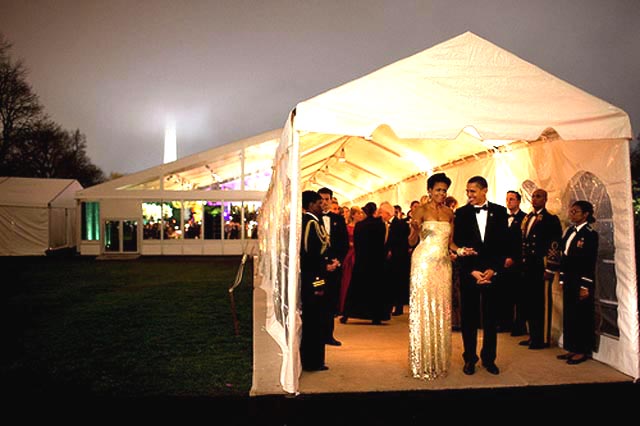
When Bhairavi Desai met President Barack Obama on the receiving line at the Administration’s first State Dinner at the White House, she introduced herself as the director of the New York Taxi Workers Alliance. Obama smiled his high voltage smile and bending down, confided: “I was an organizer too!”
“It was such a thrill to hear him say that – it was such a nice endorsement of my profession,” recalls Desai, who is a fearless advocate for the rights of New York cabbies. She and co-founder Javaid Tariq were both guests at the glittering dinner with celebs and politicos, a party which possibly America’s entire population wanted to attend but to which only 320 guests were invited, not counting the gate-crashers Michaele and Tareq Salahi.
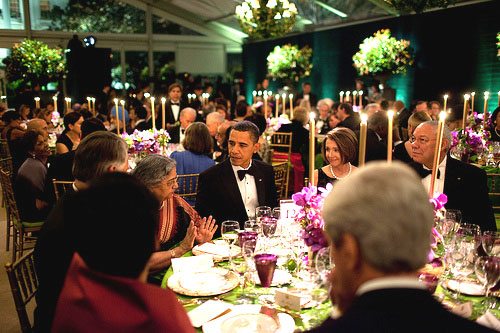
The dinner in honor of Prime Minister Manmohan Singh and his wife Gursharan Kaur had a crème de la crème guest list including power people, politicos and movers and shakers such as Mukesh Ambani, Kiran Mazumdar-Shaw, Sunil Bharti Mittal, Parag Saxena, Ratan Tata, Sam Pitroda, Dr Amartya Sen, Indra Nooyi, Jhumpa Lahiri, Deepak Chopra and Fareed Zakaria. Add to that A.R. Rahman, Steven Spielberg, M. Night Shyamalan, Dr. Sanjay Gupta and an array of US policy makers, celebrities and tycoons and you get the idea.
Yet this elite guest list included at least half a dozen hard-working social justice advocates from the South Asian community including gay rights activist Urvashi Vaid, Deepa Iyer, director of South Asian Americans Leading Together (SAALT), Annetta Seecharran, former director of South Asian Youth Action, Maneesha Kerkar, director of Manavi, and Seema Agnani, director of Chhaya CDC. So it seems do-gooders also made the cut!
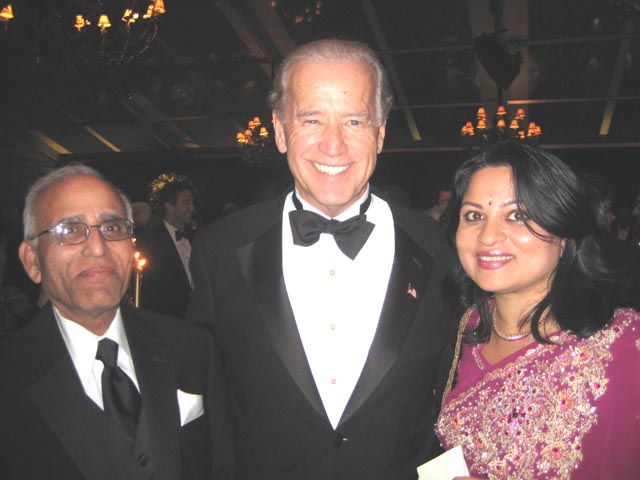
“For all of us it was very meaningful to be there because usually these events tend to give access to high level donors, elected officials and they don’t usually have community based advocates attend,” says Iyer who took her father Vasudeva Iyer as her guest. “It showed that part of the fabric of the Indian American community is also people like us who are working in the community, advocating for the community.”
Desai and Tariq were seated with Richard Trumka, President of the AFL-CIO, the highest ranking labor leader in the US, and were just two tables away from the President who sat with India’s First Lady, Gursharan Kaur, House Speaker Nancy Pelosi, Colin Powell and Senator John Kerry. Mrs. Obama and Prime Minister Manmohan Singh were at another table across the walkway.
Desai recalls that she and Tariq walked up to the President during dinner. “We asked him if we could give him a tour of NYC in a taxi and he said that while Secret Service would not let him do that now, he would definitely take up the offer in the future.”
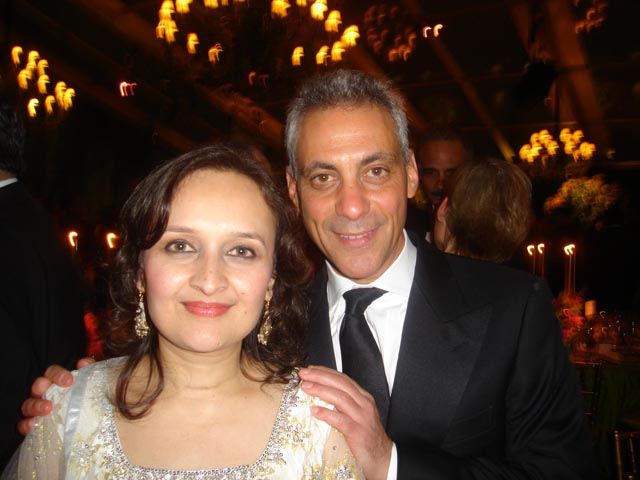
Social activists, who usually pound the pavements, protest behind police lines and work long hours with the marginalized and the forgotten, dressed up for the grandest party in town. They got to meet the President and Prime Minister Manmohan Singh on the receiving line, and rub shoulders with the power people, even making important connections for the work they do.
“It is unusual for advocates to be invitees,” says Desai. “What’s remarkable is that amongst the South Asians who were there it was not the business elite. And that’s what was really fascinating. Our community tends to pride itself for its business leaders. It’s interesting to see that people outside the community recognize a different leadership in a different class. To me, what was remarkable was to have a White House recognize social justice leaders as the representatives of the Indian community.”
Deepa Iyer, who was seated next to Louisiana Governor Bobby Jindal and his wife, says, “The whole event was really well-done, well executed, it was not over the top or ostentatious, everything hit just the right note.”
She added, “The President and the Prime Minister remarked upon the contributions of the growing Indian-American community in the US. It’s important to recognize that among the corporate leaders, the entertainers, and the elected officials, are also people like us who are advocating and have a seat at the table, quite literally for an event like this, and hopefully more importantly for purposes of affecting policy change.”
For Iyer, it was particularly special because her father, who has a small medical practice in Kentucky, came as an immigrant many years ago from Kerala. The White House was iconic, very far away. She recalls, “He came up especially from Kentucky for the State Dinner and kept saying ‘I never ever dreamt that I would shake the hand of the President of the United States.’ It was really nice to share the evening with him and I think it’s a memory both of us will cherish for a long time.”
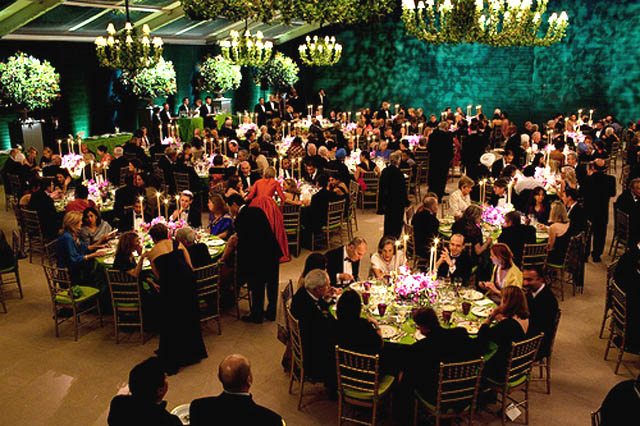

6 Comments
Thanks, Komal. Well, there was coverage of the State Dinner – but the party-crashers stole the limelight and got all the media coverage!
LOVE LOVE LOVE this story on the Obama dinner! I have been looking for coverage in the mainstream press about the PM’s visit and not finding anything. I especially like the angle you took of interviewing the public policy advocates for their POV rather than the big muckety-mucks, which we hear enough about already.
Thanks, Vandana. It was fun unearthing this story from the guest list!
Diditi, there definitely seems to be a different wind blowing. Perhaps with an organizer in the Oval Office, the profession will now get more respect. As a journalist who’s followed the unsung work of these advocates over the years, I think it’s about time!
Great piece Lavina – enjoyed reading it
Great to see the faces that make a world of difference, like Bhairavi Desai of NYTWA and Maneesha Kelkar of Manavi. I am familiar with both of their contributions toward a working class movement and gender violence within the South Asian American community respectively. I am extremely excited to see that people like them who envision a different world that is more inclusive made it to the guest list!